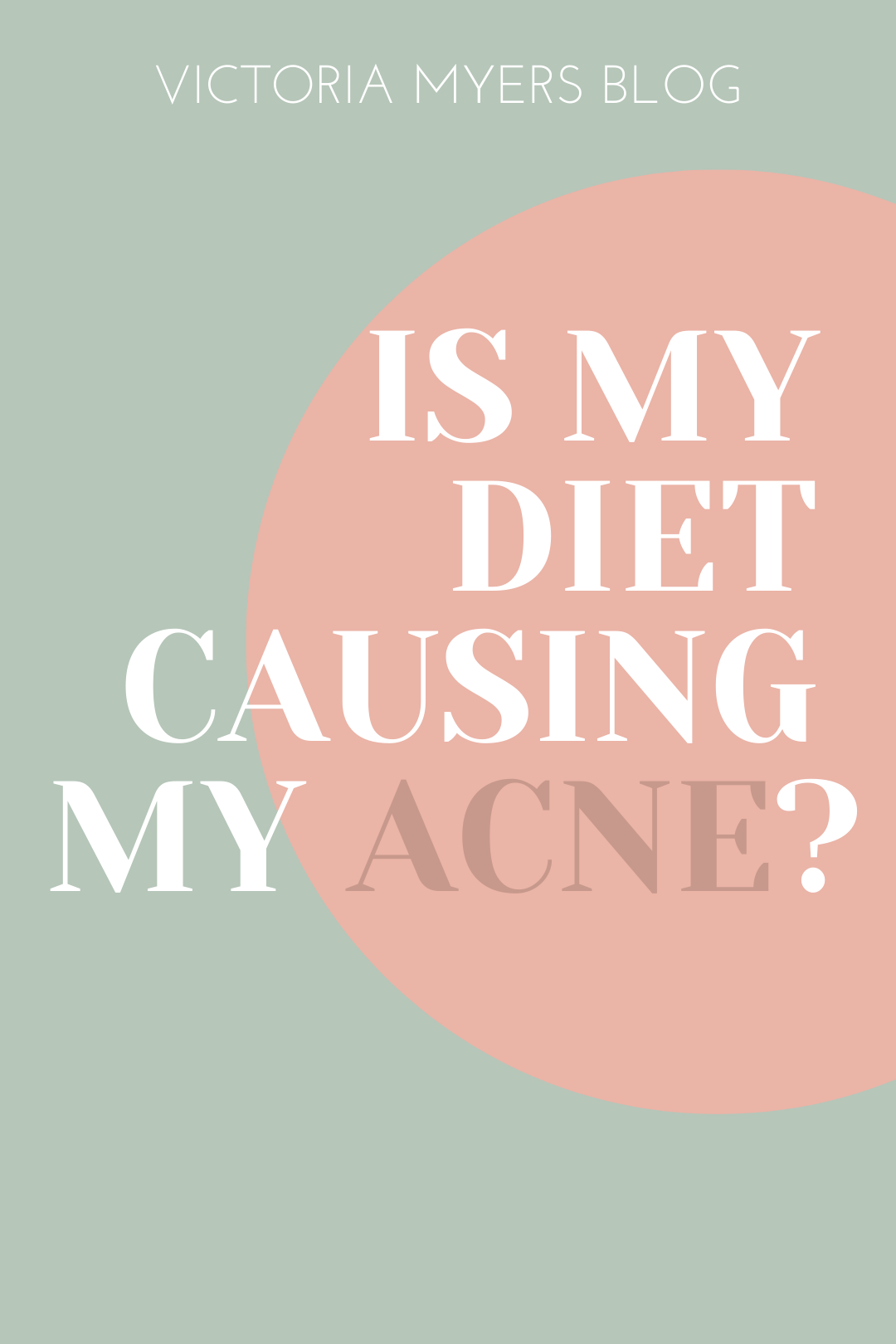Is My Diet Causing My Acne?
By: Megan Perez, dietitian at Nourishing Minds Nutrition
Acne can be incredibly frustrating and is very common for our clients at Nourishing Minds Nutrition. Not only is it obnoxious, but it can be incredibly embarrassing and even cause despair in your daily life. If you have never struggled with acne, you may think I’m being dramatic. If you have experienced life with acne, you know just how much misery it can cause. This article will explain what acne is, its different types, along with common causes and myths. Finally, I will leave you with a few strategies to start healing your skin today.
Acne is a condition of the skin in which pores are clogged with oil, bacteria, or dead skin cells. These clogged pores often occur as a result of hormonal changes in the body, but there are other reasons this could happen, as well. We often think of acne as affecting teenagers, but adult acne is more common than you think! Adult acne can occur in both men and women, but it seems to be more prevalent in women due to the many hormonal changes that occur over the lifetime (think menstrual cycle, pregnancy, and menopause).
Acne vulgaris is the most common type of acne and is typically found on the face, chest, and back. As skin regenerates, old cells slough off. If dead skin cells aren’t removed from your pores, and they combine with sweat and oil, they could become trapped and cause pimples. Blackheads, whiteheads, papules, pustules, nodules, and cysts are the most common types of pimples. These are categorized into 3 main groups:
Comedonal Acne - white heads and black heads
Inflammatory Acne - pustules and papules
Nodulocystic Acne - nodules and cysts
Comedonal acne is not typically inflamed. In inflammatory acne, naturally occurring bacteria is involved and often causes swelling and inflammation. Cystic acne is the most severe and least common type.
What about hormonal acne? Hormones are actually a cause of acne and not a type.
While there are many assumptions and myths about acne, here are what I’ve found to be the main causes:
Genetic history
An excess of the androgen hormone
Too much oil production
The presence of bacteria
I want to remind you that some of these factors are out of your control! Diet, lifestyle, and toxin exposure may all play a role in worsening acne, however they have not been shown to be the root cause. This is one reason why treating acne can be so tricky. We have to look at each case as a whole, and not focus solely on the daily choices we make. For most of our clients, hormones are a major factor for acne. In our practice, we see hormonal imbalances that are often a result of under-eating (often times resulting in amenorrhea), excessive stress (from many things including disordered eating), coming off the birth control pill, or medical conditions (PCOS, thyroid conditions, or others). In these cases utilizing a Dutch hormone test can be incredibly helpful and enlightening! We could make guesses about what your hormones are doing, but we won’t actually know unless we test! Once we have hormonal test results, we can use specific and targeted supplementation to aid in balancing hormones, hopefully improving skin conditions.
What about diet? After evaluating the evidence, some research suggests there is a diet-acne link, however, most of these studies have been observational. The results have relied on self-reported dietary intake and acne occurrence, which can be flawed. The research that appears to show a correlation between acne and dairy or high glycemic index foods has many limitations. For example, there is not enough research on the type of dairy and acne, such as low fat dairy vs. full fat dairy or conventional vs. organic. Diet may influence skin to some degree, but the research does not show a strong correlation.
Does stress play a role? When you are stressed, your body releases the hormones cortisol and adrenaline. When these hormones increase and decrease, your skin produces more oil, which may cause or worsen pimples. This does not happen with everyone who experiences stress, but it is a common cause and something to look into if you experience skin issues. Stress is also a factor in the health of our gut microbiome and our immune system. The same strategies we recommend for stress management to improve digestion may also help to improve skin conditions.
Here are a few strategies for anyone experiencing acne who is looking for a good place to start:
Drink water - aim for 8 glasses of water per day
Sleep - aim for 7-9 hours of sleep per night (wash those pillow cases, too!)
Re-evaluate your current face routine and cleansers - speak with a dermatologist or esthetician to determine your skin type and what products may work best for you
Reduce stress - this may involve improving your relationship with food or taking up meditation
Gentle nutrition - if you are an intuitive eater or ready for advancing your nutrition, you may consider adding anti-inflammatory foods (fruits, vegetables, omega 3s) or decreasing inflammatory oils
Acne can definitely be a complex condition! If you have been implementing these strategies with no immediate improvements, I encourage you to be patient and compassionate. It can also be extremely helpful to see a dermatologist to determine your specific type of acne. For some, relief is only found with medication. If you believe your acne to be caused by hormonal imbalance, I always recommend focusing on stress management, sleep quality, and adequate hydration first! Then, as we always say, “test, don’t guess.” It’s important to remember that stressing about your acne or stressing about food or body image will likely make your skin worse. Improving your relationship with food and your body is a great first step.
Thank you so much Megan for this incredibly helpful blog post! You can learn more about Megan and reach out to work with her here.







